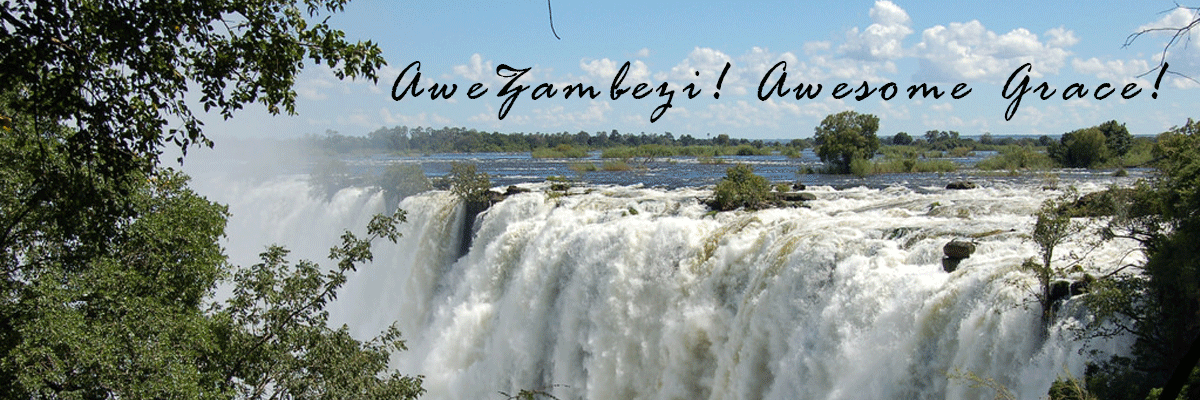by Ramesh Richard
Awesome. My teenage kids use that adjective too often. Everything from pizza to nice weather casually qualifies as awesome. I gently as my “pre-people” to be more discriminate in its use. Basically an exclamation, the word conveys joy, celebration, and mystery. But most of all, it attaches to something that defies overstatement. We shouldn’t trivialize a word that must be conserved for appropriate use.
- Jordan, of the famous Chicago livestock company, defies gravity to dunk basketballs from lower space orbits. Incredible though he may be, his superhuman feats will someday be superseded by another “awesome” player. If today’s computer technology is awesome, how would you describe tomorrow’s? Awesome participates in that which cannot be superseded. Awesome describes “that beyond, over, and above which nothing is greater.”
Punctuating the Zambezi River with its majestic 420-foot cascade, Victoria Falls broke down my adult linguistic reservations. Its energy, size, and volume was…well…simply awesome! Victoria Falls overwhelmed our senses. We were at a loss for words. Before leaving, I coined a new word: “AweZambezi”—mighty Victoria on the Zambezi was greater than anything we could imagine.
Our visceral, bone-deep, skin-tingling experience intuitively connected me to an awesome biblical truth: Victoria Falls parallels grace. Grace—the fundamental principle of godliness beyond, over, and above which nothing is greater. I saw New Testament grace irresistibly surging through Victoria’s plunging waters. Awesome grace! AweZambezi! Come along with me to view three edges of this powerful metaphor for grace.
Greater Than Our Greatest Fantasies
Like God’s grace, Victoria Falls (at one and a half times the height, twice the breadth, and three times the volume of Niagara Falls) is greater than our greatest fantasies. Before witnessing Victoria, I could not imagine anything greater than Niagara. Then Victoria took my breath away. I understood what the US first lady meant when, upon first seeing Victoria Falls at the turn of the century, she cabled two words back home: “Tell Niagara.”
Seeking salvation by feverish, favor-seeking fervor—this is sheer religious fantasy. If human invention is all we know in striving to secure eternal salvation, then all we “know” is vain error. The human condition is so desperate, so needy, that even the very brightest ideas imagined by man for rectifying his condition are no more than vain gropings after God. The human imagination knows only one way to come to God—self-commendation on the basis of good works. The world’s religions are ample testimony to man’s persistent attraction to worldly wisdom (1 Corinthians 1:21-31) instead of God’s grace.
Who could ever have imagined God’s grace-way of salvation: that all humanity—best and worst, rich and poor, Pharisee and publican—must come to God without resource to their own goodness? Unmerited favor, like the Victoria, goes beyond, over, and above human accomplishment. The glory of God’s grace (Ephesians 1:6) far supersedes the best of our own conceptions of salvation. Amazing grace!
Greater Than Our Faulty Circumstances
Next, God’s grace, like Victoria Falls, is greater than our faulty circumstances. Over seventeen million cubic feet of water a minute plunging over a mile-wide cliff brought us extraordinary visual delight. Its ineffable abundance, overflow, plenitude—they all point to awesome. Great plumes of vapor rose a thousand feet into the African sky. Its deafening roar echoed the grace of God that has been abundantly (1 Timothy 1:14) given to us. God knows how to pour on even greater grace (James 4:6). Both of Peter’s epistles open with unstoppable, overflowing grace: “May grace and peace be multiplied to you in the fullest measure” (1, 2 Peter 1:2).
In all your circumstances, you need God’s grace. Regardless of their immensity, circumstantial needs cannot overcome grace. God’s grace is much bigger. If grace is the means of your eternal salvation (Ephesians 2:8-9), physical survival (Acts 14:17), and spiritual service (1Peter 4:10), you cannot be too greedy for grace. We were warned not to go to Victoria Falls before noon if we didn’t want to get soaked by the wind-blown spray. So we went at three. Still our clothes dripped, droplets formed in our camera lenses, and my hair frizzed like a poodle. We just couldn’t evade the curtain of mist. That’s how grace is—an abundant, inescapable flow.
You can attempt to rearrange the twists and turns of your life, but grace will still come through in each and every circumstance. Grace just keeps on coming. How else can you explain that you are still alive? How else can you account for answers to prayers that you have not yet prayed? What sustained you when you despaired? What helped you cope with life’s seemingly impossible demands? Grace!
In every one of your circumstances, you can receive His unlimited enablement because “[His] grace is sufficient for you” (2 Corinthians 12:9). There is never a time when the flow of grace stops. A drought in your relationship to God may slow it down, but it always sprays. “God is able to make all grace abound to you, so that in all things at all times, having all that you need, you will abound in every good work” (2 Corinthians 9:8). Abundant grace!
Greater Than our Fractured Lives
Finally, “grace, grace, God’s grace” is greater than our fractured lives. A Readers Digest article entitled “Natural Wonders of the World” tells us of deep fractures in the bed rock that account for the tortuous contours of Victoria Falls. Vertical fractures crossing each other at sharp angles are really lines of weakness highly vulnerable to erosion. At the end of the immense Devil’s Cataract you can see the signs of another fracture beginning to form. Sometime in the future, as erosion reshapes this sector of the canyon, the entire flow of the Zambezi will spill over the edge of a newly created abyss.
Our fractured pasts are not as pretty as we would like them to be. Grace covers all those closeted ghosts. We make ourselves appear far better than we really are. Grace helps us accept ourselves as presently are. Like fracturing cataracts, our future fractures are predicted and covered by awesome grace. Salvation is by grace, so forgiveness and security must also be by grace. God saved us knowing everything about us—past, present, and future—ahead of time.
Grace is unconditional blessing. If conditions were attached to the riches of grace (Ephesians 1:7), they wouldn’t be riches and it wouldn’t be grace. This is “grace that exceeds our sin and guilt” from “Calvary’s mount outpoured.” Even if the world’s religious are “longing to see His face” by grace, they do not have the grounds for grace—the mighty Cross—to “pardon and cleanse within.” We need a grace that is “broader than the scope of our transgressions, and greater far than all our sin and shame.” That is God’s grace, greater than all our fractures, fissures, and foibles. Awesome grace! AweZambezi!
The Smoke that Thunders
A severe drought in 1992 reduced Victoria Falls to a pale trickle. No one had seen that happen before. They were bewildered that the mighty Zambezi could become but a weepy drip. So they prayed to the Father. I was in Zimbabwe a few days after the rains had returned to join Christians in a thanksgiving service to the God who sent them. The entire nation burst out in song. They could se and hear “the smoke that thunders” (the local moniker) again. The Victoria was making a comeback.
I don’t know what causes reduction in the flow of full-strength grace in your life. Has the unbelievable happened? Have you “fallen from grace” (Galatians 5:4) into manipulative, legalistic routines? Has grace become a trickle, as you snoop out other Christians to judge them? Have you become defensive in justifying sin by grace? Stop and consider. Then ask the Father to drench you with His grace, to pour it all over you, to let you feel its exhilarating spray again. “Let us then approach the throne of grace with confidence, so that we may receive mercy and find grace to help us in our time of need” (Hebrews 4:16).
The only thing work than grace becoming a trickle is grace being taken for granted. Our tour guide makes two trips to Victoria Falls every day. He remarked that he was no longer interested in seeing this wonder of natural wonders. Though he owed his livelihood to Victoria, she no longer awed him. That is no more sad than we Christians taking grace for granted. Our spiritual livelihood depends on grace.
Introduce tourists to God’s grace. Regularly. Enthusiastically. Never grow tired of God’s unmerited favor. Take God’s unlimited enabling for all you can get. There is nothing greater than God’s unconditional blessing. Amazing, abundant, awesome grace!
I close this parable with a prayer from the Apostle: “May our Lord Jesus Christ Himself and God our Father, who loved us and by His grace gave us eternal encouragement and good hope, encourage your hearts and strengthen you in every good work and word” (2 Thessalonians 2:16-17).
Ramesh ministered about three weeks in South Africa and Zimbabwe. In South Africa he concentrated on the two neglected races there, the “colored” and the Indian. In Pretoria he addressed some 250 presidents and academic deans of theological institutions at the Global Consultation on World Evangelization (GCOWE) ’97. His second trip to the Zimbabwe capital, Harare, Ramesh taught a four-day seminar for pastors there. He was joined by wife Bonnie and children Robby, Ryan, and Sitara, who ministered in several Harare public schools.






